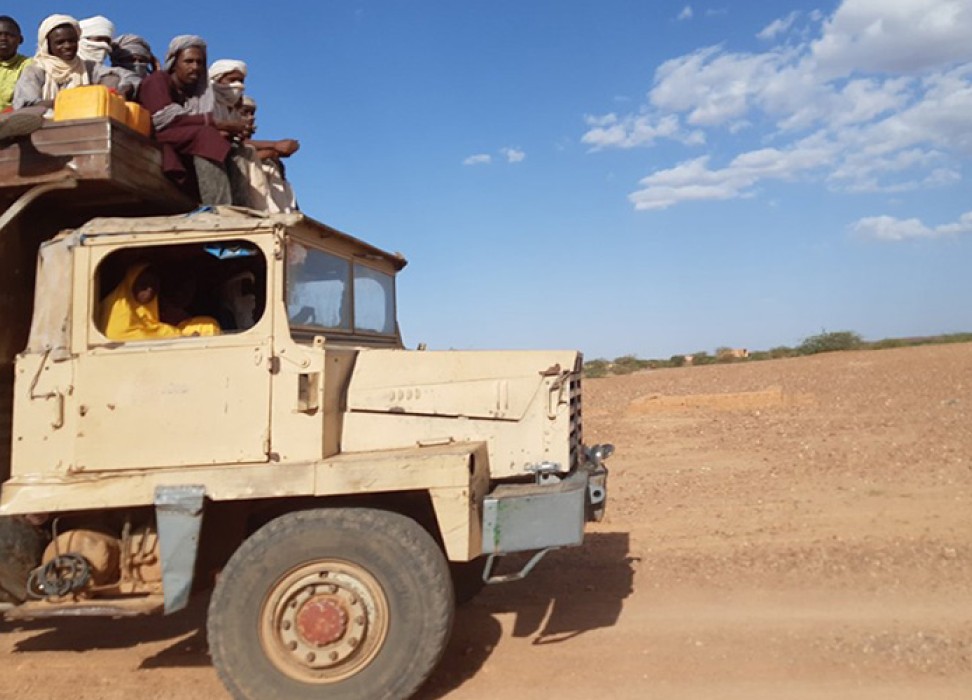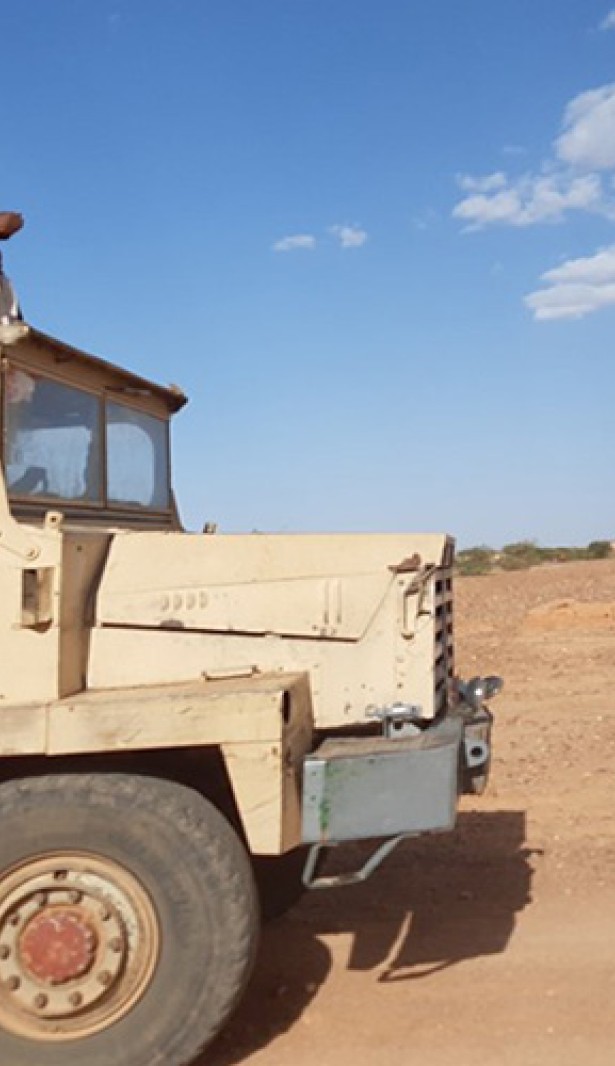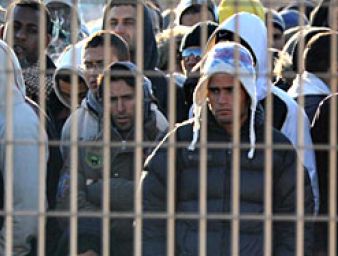Seeking effective protection of migrants' rights in Niger
19 December 2019

Fatou,* an 18-year-old Guinean, longed for a life with dignity, far from poverty: "I just wanted to leave the country. We cannot stay in Guinea, there are too many problems here." Nwankwo,* a young 30-year-old Nigerian, aspires to come to Europe: "I am an IT programmer. I wanted to improve my future."
Rackets, arrests, detentions, deportations
Like the majority of West Africans who decide to migrate, Fatou’s and Nwankwo’s motivations were diverse and complex. For Nwankwo, his motivations were mainly related to limited economic and educational opportunities. For Fatou, environmental concerns, the poor healthcare situation in her home country as well as family problems pushed her to migrate.
Like many other migrants, they experienced racketeering at every checkpoint, arbitrary arrests and detentions, deportations but also torture and mental and physical suffering at the hands of both State and non-State actors. Most often, these human rights violations and abuses are committed with impunity. Migrants are forced to depend on "facilitators" for housing, for medical assistance, for finding work, as they fear arrest if they use regular channels.
"In Mali, I worked but police officers took my money and tortured me. In Burkina Faso, I did not have the money to pay the gendarme so I spent 24 days in prison. In Niger, I worked for 3 months to pay to get to Europe. I went to Libya where I spent 3 months in prison. They tortured us there. My family paid and I got out. They took us to the sea, we were 130 people. There was an accident in the boat we were in. Some died, with others, I was saved. I fled to Algeria. There, the soldiers grabbed me and left me in the desert at Tamanrasset. I was able to reach Assamakka and from there, along with other people, we drove to Arlit. During the repatriation, they take your money,” recalls Fatou.
Nwankwo explains: "I left Lagos for Kano state, in northern Nigeria, by car. From there, I reached Agadez via Zinder and the village of Memouja. I paid a driver to get there. I also paid a driver from Agadez to go to Libya, where I spent days in the desert. We were a group of 21 people. We had no water nor food. Some Libyans have sold us. I spent 11 months in prison where we were beaten. A friend finally paid for my release and helped me reach Agadez."
Like many migrants who have taken different routes to try to reach Europe, Fatou and Nwankwo passed through Niger and returned to Niger against their will. This transit country has become a sort of sentinel helping to reduce population movements to North Africa and the Mediterranean.
Niger, a transit area for migrants from sub-Saharan Africa
As a gateway from West Africa to the Sahara, Niger, and the Agadez region, specifically, has historically provided a hub for trade and communication for western Africans who come and go legally under the Economic Community of African States (ECOWAS) treaty. It also became a lucrative place for people smugglers.
"People have made a lot of money, with the influx of migrants here, in the range of 2,000 to 3,000 each week. Everybody was working, markets were bubbling, money was circulating," stresses Bachir Amma, president of the Association of Former Migration Providers in Agadez, and former smuggler himself from 2001 to 2016.
The 2015-036 law against the smuggling of migrants has changed the situation. This law, implemented in 2016, aims to put a stop to the movement of populations to Libya and Algeria. However, it has also had the effect of hindering the mobility of foreigners and nationals within Niger. Bachir explains: "People had work, but now they are told that their work is illegal. What do you want them to do? When after one year, two years, nothing has been done to help you get trained, the majority of the ex-smugglers return to their former activities. Even though it means risking their lives and the ones of migrants.”
In fact, the 2015-036 law has led migrants to seek increasingly dangerous migratory routes, leading to increased risks of human rights violations.
"Since the implementation of this law, a lot of people died and were abandoned in the desert. Before, when a migrant arrived in Agadez, they settled in ghettos (areas where the migrants reside while waiting for departure to North Africa) and had the right to go wherever they wanted. Today, when a migrant arrives, they remain locked in the house of the smuggler until the departure,” continues Bachir.
The PROMIS project for an effective protection of migrants’ rights
It is within this context that the PROMIS project ("Protection of Migrants: Justice, Human Rights and Migrant smuggling") was established in Niger. PROMIS is a joint initiative between the West Africa Regional Office of UN Human Rights and the United Nations Office on Drugs and Crime (UNODC). It aims to strengthen the fight against migrant smuggling in Western Africa, from a human rights-based approach.
Since the project’s start in November 2018, UN Human Rights has worked to strengthen the capacities of Niger to develop a human rights-based response to smuggling of migrants and effectively address human rights violations related to irregular migration. According to Andrea Ori, head of UN Human Rights West Africa Regional Office, in Dakar, it is about "moving from a perception of migrants as a burden to a perception of migrants as human beings."
Through this project, UN Human Rights will enhance the protection of migrants’ rights and their access to justice. The organisation will also seek to prevent and mitigate the the traumatic and unlawful treatment experienced by migrants in Niger, including by Fatou and Nwankwo. UN Human Rights will conduct assessment missions on migrants’ rights, provide technical and legal assistance to national human rights institutions, paralegal/legal institutions and civil society actors, and provide grants to civil society organizations working on migrants’ human rights.
The rights of migrants are affected as soon as they take the road to Agadez. "They are threatened and are victims of racketeering on the roads by the police. When they arrive in Agadez, they are not allowed to go outside. What about their right to mobility? Yet they are supposed to be at home, wherever they are in the ECOWAS region" says Bachir.
While it is important to note that while the PROMIS project is an innovative human rights-based approach to migrant smuggling, there is a need to pursue a human rights-based approach to overall migration governance that places migrants at the center of migration laws and policies. A human rights-based approach results in better and more sustainable outcomes for migrants and communities of origin, transit and destination. With the adoption of the Global Compact on Migration, Member States have endorsed a human rights-based roadmap for international governance of migration.
Nwankwo is determined to try again: "I will still try to go to another country in the future. But I do not want to take this kind of risk in my life anymore.” Fatou, who has suffered psychological trauma from her first attempt, now wants to go home: "I wanted to go abroad. Now I want to go home, I have nothing but I will see what I can do. We need change. The government has to think about the youth. We are suffering".
--------------
* The names have been changed.
19 December 2019



